|
Learning to play a musical instrument, even at an elementary level, is going to take effort and persistence. Any activity that helps you to maintain your enthusiasm should be welcomed. Here are five ways I assist myself. You might think up your own list.
0 Comments
A New Student's Profile
The new student is a young professional with a keen interest in learning to play jazz piano. They took piano and trumpet lessons in high school. They have a basic understanding of music theory. Aural skills are excellent. Their program will include the following components:
David
Have a great summer. If you would like to meet in the summer, call me. I have some limited availability. Cheers, david Years ago, while adjudicating piano exams in Aurora Ontario, I heard a young child came in to sit for her grade 2 piano exam. The performance was so beautiful, it took my breath away. Could you learn to play as well as her? Yes, with patient work. Thankfully to play the piano competently only requires you to follow a well-worn path. A path that has evolved over the last two hundred years beginning with CPE Bach's 1787 "Essay on the True Art of Playing Keyboard Instruments," to today's Adult Piano Adventures by Nancy and Randell Faber. I invite you to follow the links for more information. However, you will need to plan to succeed; so please consider the following conditions that you will need to meet:
If I can help you, please call me. David text: 905-330-1349 Listening (5 minutes) Listen to professional recordings of the piece(s) you will be practicing today and then play your "party piece" or your "goto" piece.
Warm-up (10 minutes) Play your assigned scales, arpeggios, and technical exercises. Multiple repetitions are recommended. Repertoire (20 minutes) Play your piece(s) focusing on sound quality, phrasing, dynamics, and rhythm. I suggest working on small chunks Later, when you are close to the exam, you should run your program, without stopping, to build endurance. Sightreading (5 minutes) Theory (10 minutes) Ear Training (5 minutes) Review the requirements of the grade. Conclusion (5 minutes) Review an old favorite If I can help you, call me. David How should I practice piano?
To practice piano effectively, here are some steps you can follow:
Have fun: Finally, make sure to enjoy the process! Playing the piano should be a source of joy and fulfillment, not stress and frustration. ---------------------------- Not bad. However, recording yourself is missing. David Without desire you have nothing" Madame Boulanger It is a good day to revisit the elements of musicianship. These are the areas of practice and/or reflection that successful musicians and earnest students consider, do, and follow.
1. They listen to professional recordings and mark up their scores in response to what they hear. This is the shortest way to develop stylistic awareness in your playing. 2. Theory helps musicians understand what they are listening to, communicate with their colleagues and teachers, and see the structural patterns within the music. 3. A fine sight reader takes less time to learn a new piece. Furthermore, a fine sight reader can play music for fun, without preparation. 4. Technique is the pillar of success; nothing is worse than hearing music in your head that you cannot execute. 5. Aural skills are ear skills connected with theory skills.
6. Historical awareness is the depth of knowledge and experience a musician/student brings to a project. If you want to play country music you have to know the players, repertoire, and historical styles of the genre, or your performances will always lack insight and finesse. Ditto for jazz and classical music. 7. However, your emotional commitment to the project is the most crucial element of musicianship. You must have faith that, with time, your goals are reachable. Students who follow the curriculum, practice correctly, attend concerts, listen to music, hang with other adults on the same path, seek additional information to support what they learn in lessons, ask questions, and persevere will win. If I can help, call me. David The real estate coach Tom Ferry, says if you have three or more goals for your business this year, you have no goals. Ditto for piano. Here are some realistic goals for my students.
Call me, I can help. David Super video demonstration but...
Let's consider the assumptions he is making about you the student/listener.
What is my job? I prepare students to understand and execute what he is talking about. The first thing we will do is assess your situation and then we'll draw up a logical plan.
Call me, David BTW: in 2017, I studied with Peter Martin in Rome Italy at the ROMA Jazz Workshop. I was in Rome studying jazz drumming with Greg Hutchinson. Greg played in Ray Brown’s last group. Peter is a great guy and a very skilled musician. When I grow up, I want to play piano like him. Updated 2024 What to practice, how to practice, how much to practice, when to practice can be sources of anxiety to students preparing for a piano exam. To succeed one must spend time on each area of study.
Try dividing up your time on the piano bench as indicated in the drawing; give equal time to each area. Now if you are like me, your attention span is long as a puppy's. No worries, jump around. But keep track of your time in each area.
Good luck David Here is one profile of a successful student who thrives on boundaries, discipline, and competition.
Mei diligently practices the following activities:
If I can help your Mei; please give me a call. David I recently attended the Louisville Jazz Workshop at the University of Louisville in Louisville in Kentucky. The legendary bassist Rufus Reid gave a stunning solo recital. His playing was exciting, imaginative, dynamic, and colourful. Later that day he shared his practice tips with the audience of jazz students. He stressed that no matter how long our practice session might be students need to include the following:
• Technique. Practice the basics and get on top of your instrument. Make sure you can keep the beat, the count, and the groove. • Style. Practice producing a “good sound”. Play your instrument in "a nice way". Be creative with your approach. • Repertoire. Learn the jazz standards by heart. Listen to the jazz canon, and then play along with these recordings. • Patience. He stressed being reasonable with yourself by not pushing past your actual ability. It takes time to learn to play both your instrument and the jazz idiom well. Thank you to Frank for the note outline. Here is my top 10 list of skills to work on ahead of camp. You don't need to be an expert, but you will need some familiarity with the following skills and activities.
1. Comping and voice leading chords. 2. Practice sightreading simple chord charts like blues in Bb and F, Summertime, Killer Joe, etc. Click out the Aebersold picture for some suggestions. By clicking on the image, you will go to a product page. I don't take a commission. 3. Play along with recordings. 4. Record yourself and listen back. 5. Practice playing louder because drums are loud. 6. Practice your right-hand broken chords for every tune on the Aebersold list. 7. Use a metronome on everything you play and practice. 8. Learn to clap and count aloud eighth note jazz rhythms. 9. Listen to jazz daily. 10. Sign up early to camp because piano spots go quickly. What tunes should you practice? If I can help you, call me. I've attended a dozen jazz camps over the years as a pianist and drummer. David Do you have enough time to take piano lessons?
Given the demands of overscheduled lives, most adults will have to give up some activity to make room for a new one. Google "how many hours does the average adult spend surfing on their phones?" Cutting that in half will free up enough time to learn piano. Call me when you are ready. David Revised August 2022 This is what Rick is working on.
Rick’s memorized list of tunes with study links.
Steps to soloing fluency.
Revised August 2022 Some days and weeks are going to be difficult. Life will get in the way. Here are some suggestions I gave one adult beginner to help relieve his practice room blues.
If I can help you, call me. David Revised August 2022 One of my adult students was asking tonight for some help planning his practice time. He is preparing for his Grade 8 piano exam. He is an engineer, a spreadsheet kind of guy. I'm sympathetic. Here is what we discussed. Warmup with sight reading. Use a metronome! Get into the zone. Now start practicing Technique with a 2-minute timer. Switch activities every 2 minutes = 15 minutes
Practice one short section to perfection =15 minutes Theory =10 minutes Ear Training = 10 minutes Review completed piece or pieces 10 minutes BOOM! one hour of accomplishment This may work for you. David Revised August 2022
Please excuse this short story in which I’m the hero. I’m learning to play the jazz xylophone. I started at Christmas 2021. I practice every day with my 100-year-old textbook, a stack of tunes that I want to learn, my video recorder and oodles of desire. Here is the process I usually follow.
The video below is an unedited version. Notice it took just a brief period of time to accomplish something because I didn’t try to do everything at once. David Revised August 2022 Level 1: Fun is guaranteed in level 1 by just showing up and playing. Playing in a community concert band or at the family Christmas party would be an example. On the lesson front, level 1 is leisurely and steady. Level 2: You are going to perspire. Lessons will be intense. You may be getting ready to audition to play in a high-level community group. Or you may be preparing for an exam. Regardless, the musical standards are high. Daily deliberate practice of an hour or more will be required. Success is a near certainty given enough grit and time. Level 3 is going to hurt, tears will be shed. But you are all in. Your daily focus is piano. You dream of Carnegie Hall. You have multiple lines of attack. You put yourself out there. You are preparing to be an Olympian. Many dream, few make it. But this doesn't deter you. Large amount of time and money will be spent. Results not guaranteed. Athletic parallels Level 1: Weekend running group. Level 2: Marathon preparation. It's going to hurt, but you will live to tell the tale. Level 3: Extreme endurance running. You might die. Let me know where you stand. David Revised August 2022 I spent the summer of 2001 making music on the Mediterranean near Santa Pola, Spain in a small apartment overlooking the sea. I fondly remember the sun, the heat, the paella, the wine, the flowers, and the nightly walks along the seaside promenade.
Now to the story. I had had big plans of dragging my portable piano to Spain. At the check-in counter in Toronto the agent promptly rejected the piano in the lovely crate I had built. The airline won’t let me check it as baggage because they said it was as big and heavy as a coffin. Dejected I sent it home in an in-law’s car trunk. As luck would have it, I had another in-law in Spain with an old unused Casio keyboard of sixty-five keys, one pedal, a stand, and books of Bach and Chopin. I set up that keyboard in a window with the ocean view. Then I started playing during the long afternoon siestas. Bach, Chopin, and I quickly fell in love. Apparently so did my new neighbors who, unbeknownst to me, heard me practicing hours on end through that open window. Back in Canada I started asking about for a “Classical” piano teacher. A professor from McMaster University recommended Leon Karan. I set up a lesson. It didn’t go well. I banged through some scales and thumped out my Bach. Though I was embarrased and humiliated, Leon was kind. After I recovered, he said, “you are of course going to do your ARCT?” “I am?” Five thousand hours later I earned an ARCT diploma in piano pedagogy and won a national scholarship. Thank you, Leon, for your patience. You changed my life. David Revised August 2022 Preparing to succeed is the first step. Here are some things successful student do to prepare.
1. They understand how to use Zoom. They have set up the camera so that I can see their hands. The screen is set up so that they can see me as well. Some students use more than one camera. (Most students set up the laptop on a table to the side of the piano.) 2. They have created a realistic practice schedule. They understand that learning to play the piano to a level of proficiency takes time. 3. They have created an organized practice space for productive work. 4. They understand the costs involved. 5. They have told their significant others of their plans and their need for emotional support and encouragement. 6. They understand that they need to lean on their strengths when the going gets tough. If I can help you get started, please call me. David Revised August 2022
David Revised August 2022 Theoretically yes. I'm learning to play the xylophone. What have I learned?
Best, David Revised August 2022 Tiger Rag 1917The internet is full of hucksters telling you that learning to play the piano is easy. It's not, but it is fun. Every day I watch my students grow; the days turn into years. And, inch by inch, progress is made.
If I can help you on your journey, call me. David Revised August 2022 |
You've got to learn your instrument. Then, you practice, practice, practice. And then, when you finally get up there on the bandstand, forget all that and just wail. AuthorI'm a professional pianist and music educator in West Toronto Ontario. I'm also a devoted percussionist and drum teacher. Categories
All
|
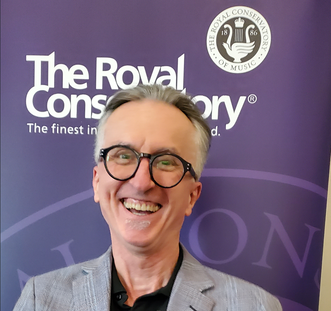
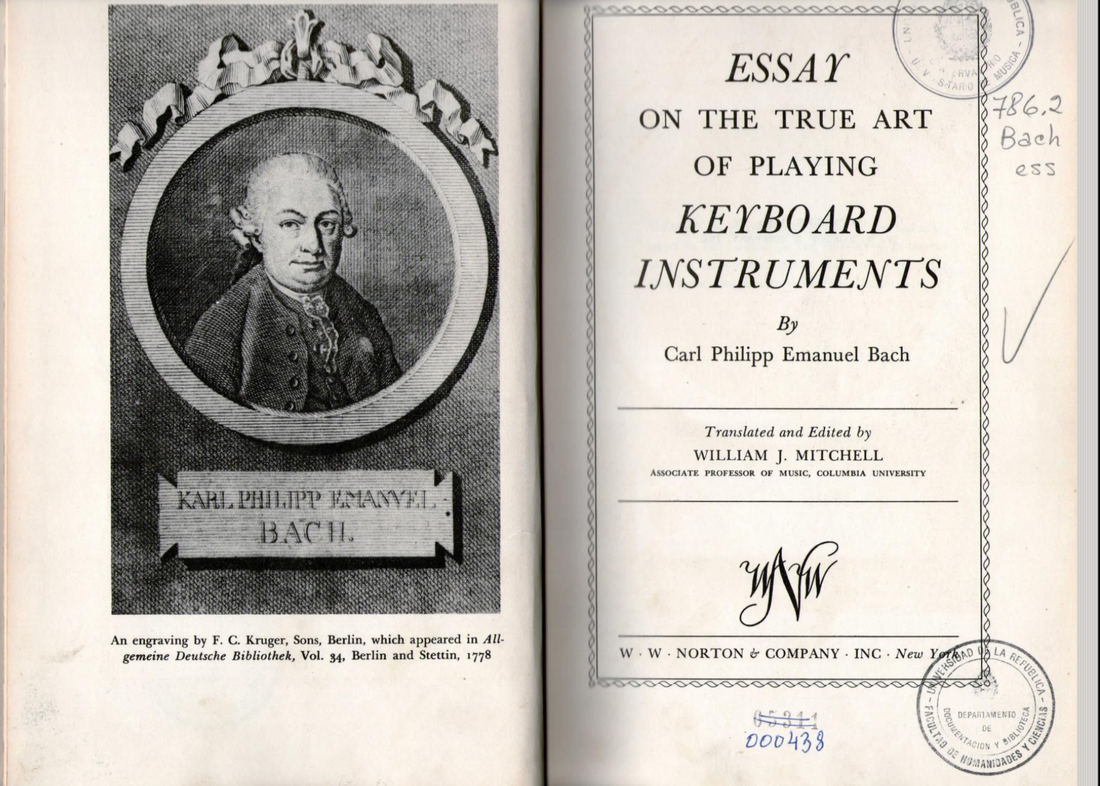
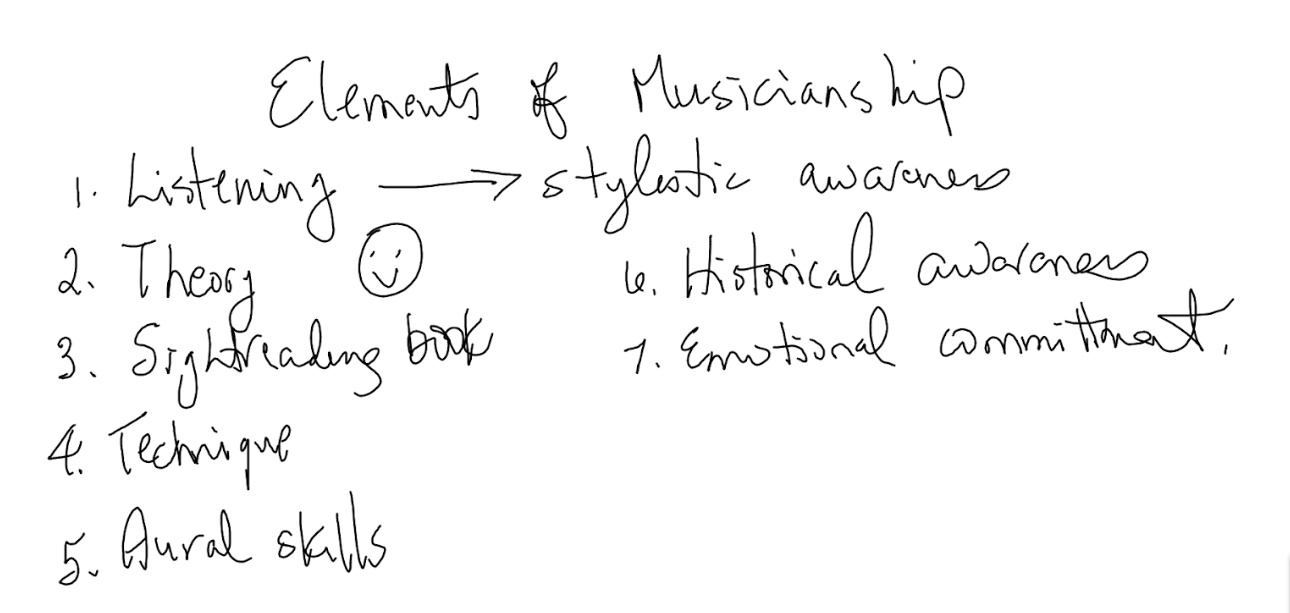
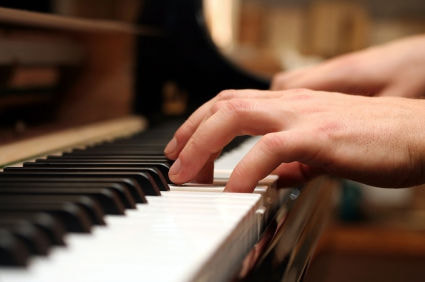
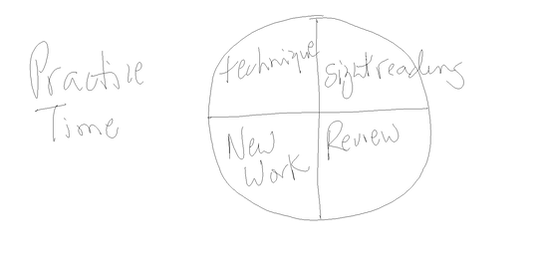
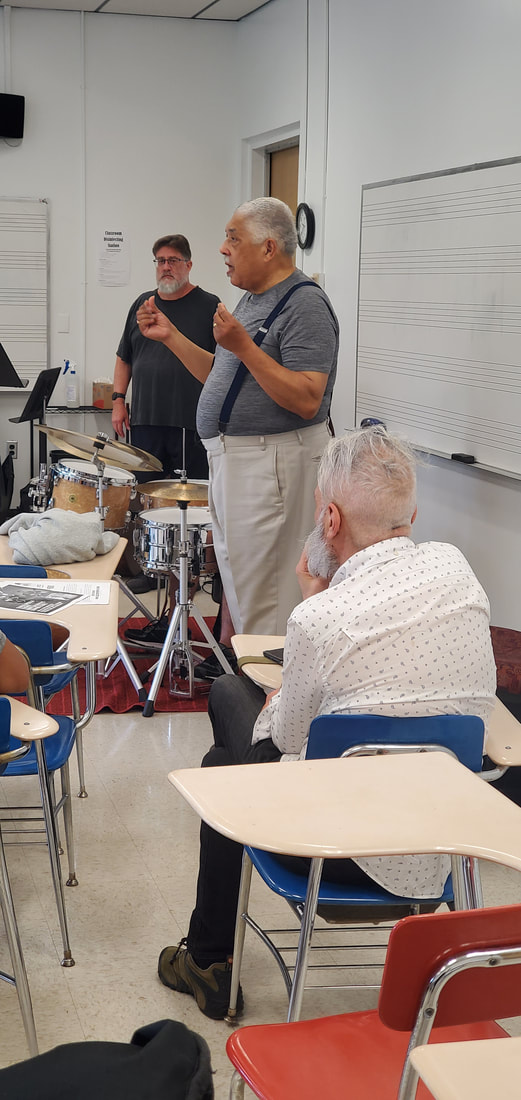
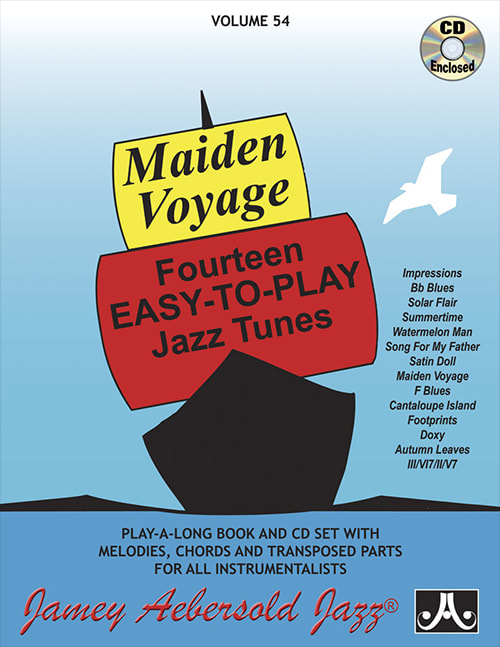
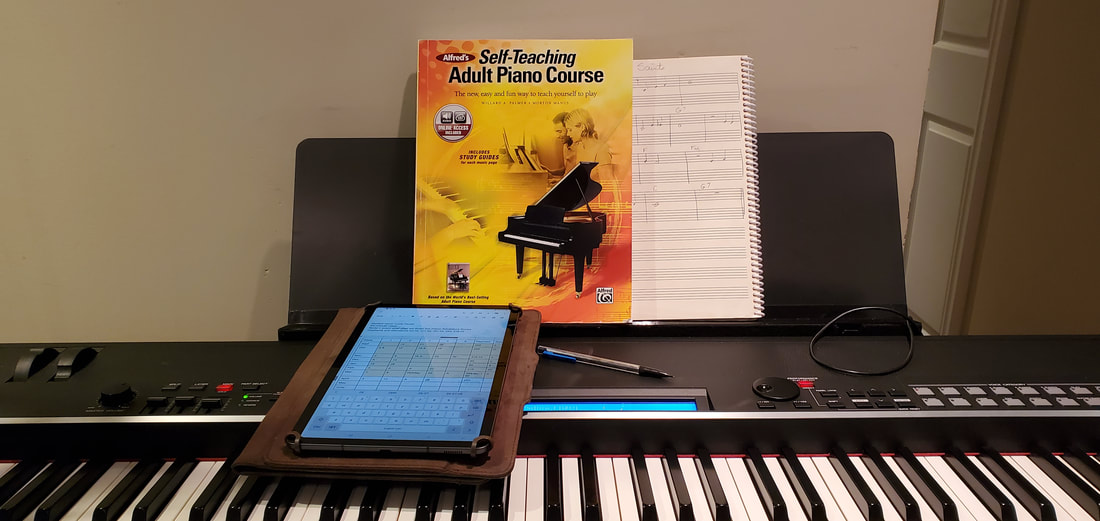

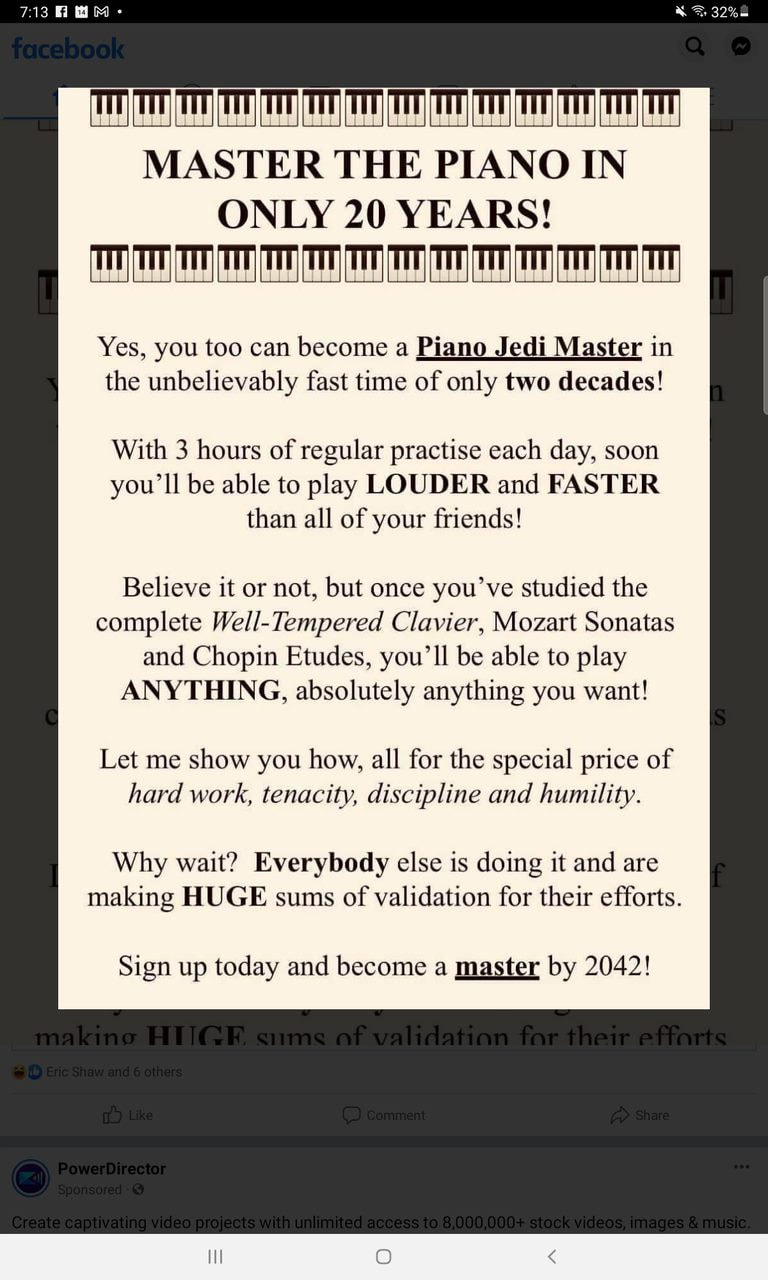
 RSS Feed
RSS Feed